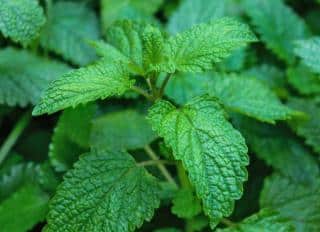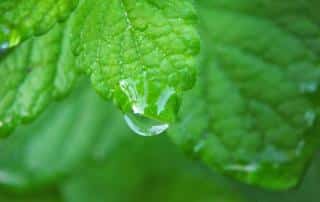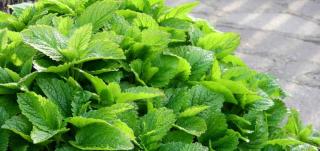

Lemon balm, or Melissa officinalis, is a perennial plant that smells like lime and offers many health benefits and a significant therapeutic value.
It forms bunches that spread through basal shoots that are about 16 to 28 inches (40 to 70 cm) tall.
Lemon balm belongs to the Lamiaceae family, it is native to the Mediterranean area.
A naturally melliferous plant, lemon balm is a highly noted antispasmodic plnt. Doctors from Arabic lands used it heavily.
In the XVIIth century, doctors would use it often to fight off nervous depression. Lemon balm is also the base ingredient of “Carmelite’s water”, which was nicknamed “drinkable gold” in the XVIIth century, and was so dear to a certain “Brother Angel”.
Cardinal Richelieu even made it his favorite ally against migraines.
Do you suffer from uncomfortable digestion, digestive disorders with heart palpitations, vertigo or syncope? Without a doubt, you’ll relish the effect of lemon balm.
 It is also known that lemon balm flowers encourage hepatic productivity, thus increasing biliary flow. It isn’t a surprise that it has beneficial activity against nervous disorders which are often related to hepatobiliary insufficiency.
It is also known that lemon balm flowers encourage hepatic productivity, thus increasing biliary flow. It isn’t a surprise that it has beneficial activity against nervous disorders which are often related to hepatobiliary insufficiency.
Another advantage of lemon balm: it soothes wracked nerves and appears to be very effective in preventing those small nervous excitements that precede or follow menstruation… Ladies, this is for you! Lemon balm is advised against anxiety, restlessness and light depression and also in case of sleeping disorders.
Lemon balm is an antiviral, most certainly thanks to the phenolic acid it contains. Ointments and extracts prepared from lemon balm attack herpes and space herpes rashes further apart. Against chicken pox and shingles, it has also proven itself worthy.
Another benefit of lemon balm: it evens out thyroid functions.
 Lemon balm infusion – ⅔ to 1½ oz (25 to 50g) lemon balm leaves for 1 quart (1 liter) water. Steep for 10 minutes. Ingest 3 or 4 cups a day. This eases digestion, reduces anxiety, enhances sleep.
Lemon balm infusion – ⅔ to 1½ oz (25 to 50g) lemon balm leaves for 1 quart (1 liter) water. Steep for 10 minutes. Ingest 3 or 4 cups a day. This eases digestion, reduces anxiety, enhances sleep.
When dehydrated, lemon balm loses all its flavor, so it is best to use it fresh. You can easily grow some in your garden or on the deck.
In case you need it out of season, it can help to have some ready already in your medicine cabinet, in the form of wine or lemon balm water.
Lemon balm wine – macerate 1 ½ oz (50 g) fresh plant for 48 hours in 1 quart (1 liter) white wine. If needed, drink two table spoons
Family-friendly Carmelite water – macerate 1 ½ oz (50 g) fresh lemon balm for two weeks in 1 quart (1 liter) clear brandy with 1/5th oz (5 g) cinnamon, ½ oz (15 g) fresh lemon rind zests, ⅓ oz (10 g) garden angelica, ½ oz (15 g) coriander, ⅓ oz (10 g) cloves and ½ oz (15 g) nutmeg. Press, filter. Keep this wine in a bottle and drink a teaspoon in case you don’t feel well.
 To thrive, lemon balm needs either full sun or part shade exposure.
To thrive, lemon balm needs either full sun or part shade exposure.
Lemon balm grows in any kind of soil, even poor, rocky ground.
Tip: Do you like varieties with mottled leaves? They tend to suffer more in full sun, best grow them as ground cover at the foot of large shrubs.
Potted lemon balm will grow very well. If you go for this option, try to choose an elegant colored variety!
Nothing special to mention here, your lemon balm will fear no bug nor disease. Actually, it’s a great large white repellent, so try and plant it around your cabbage!
‘Aurea’ – leaves start out golden yellow then turn green.
‘All Gold’ – yellow leaves.
‘Citronnela’ – a deliciously citrus-smelling plant.
‘Lemonella’ – an even more lemony scent!
‘Quedlinburger Niederliegende’ – ideal for extracting essential oil.
Lemon balm is amazing to flavor creams, fruit salad, lemonade, tea and sauces. What’s more, did you know it was part of the secret list of ingredients of “Chartreuse” and “Benedictine” fine alcoholic drinks?
– Young lemon balm shoots, when added to mixed salads, will impart a remarkable lemon-like scent.
– Have you ever tried baking fish or vegetables on a bed of lemon balm? They pick up its flavor!
– Lemon balm will delicately flavor desserts and drinks alike.
It’s also called “lemon herb”, “mint balm”, “bee balm” and many other names.
Sometimes the word “lemon grass” appears for this plant, which is a mistake. In fact, the real plant with this name is a large tropical grass (Cymbopogon citratus) which is a prime ingredient in Asian cooking. Its leaves are long and sharp, and very fragrant.
« Lemon balm » is quite similar in flavor to honey and its flowers are loaded with nectar. This is the epithome of a melliferous plant. The botanical name of the plant, Melissa, means “honeybee” in Greek.
Blandine Merlin